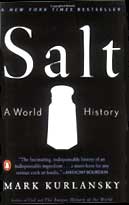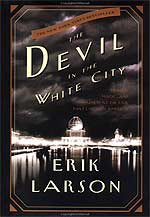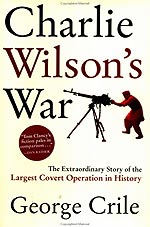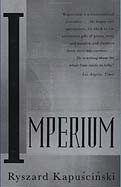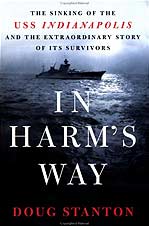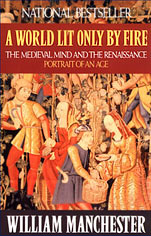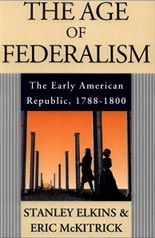Reviews: History
May 20, 2006
Salt: A World History - Mark Kurlansky
Who would have thought that something as unassuming as salt could provide the basis for such a fascinating tour through time? In Salt: A World History author Mark Kurlansky gives us a history of the world, from the perspective of the salt trade. Although we take our table salt completely for granted these days, in the not so distant past the ability to access salt was critical for a society's survival. The main use was for preserving food - cod, herring, cabbage, meat. Those countries who had an ample supply of salt could equip armies, live through winters, and engage in the profitable trade of food that would otherwise spoil without salt. Empires have been built, massive fortunes have been made and lost, all to do with controlling the salt trade. Even in nature, where there are salt licks, there are animals, taking in this simple compound so necessary for physical survival.
Kurlansky starts us off in China four thousand years ago where the act of drilling was first invented to access brine from salt wells, and takes us up all the way to the present with the Morton and Cargill companies dominating salt production worldwide. The book is extremely well researched and filled with interesting detail. A must read for any lover of history or of food.
Posted by elise at 7:24 PM | Permalink | Email to a friend
May 18, 2005
The Devil in the White City - Erik Larson
Erik Larson's The Devil in the White City is the true story of the building of the magnificent 1893 Columbian Exposition World's Fair in Chicago and the sociopath murderer H.H. Holmes who preyed on young women coming to see the fair. In his telling, Larson transports us to the late 1800s from when Chicago first wins the right by Congressional vote to host the fair, beating out rival New York City, through the two years it took to build the White City, to the fair itself, which brought in an estimated 40 million visitors during the short time it was open. Daniel H. Burnham, chief architect of the fair, led the extraordinary effort to build the fair, a feat no one thought could be accomplished in the time given. The fair drew the best engineers, architects, and designers the country had and forever transformed the shoreline of Chicago. The result was such a resounding success, Bernham imprinted grandeur into the minds of visitors who came from all over the country and set the course of American neo-classical architecture for the next fifty years.
A few miles away, in the Chicago suburb Englewood, a more sinister story was unfolding. Dr. H.H. Holmes built a boarding house on a full city block, complete with torture chamber and crematorium in its basement. On the first floor of the building Holmes ran a pharmacy, complete with bogus cure-alls, a restaurant, and several seemingly respectable businesses - fronts for countless fraud schemes.
Continue reading "The Devil in the White City - Erik Larson"
Posted by elise at 4:27 PM | Permalink | Email to a friend
March 5, 2005
Charlie Wilson's War - George Crile
September 11th made it clear that thousands of Afghans that we had armed and trained had become terrorists with the US now in their sights. How did Afghanistan become a training ground for terrorists? George Crile's Charlie Wilson's War is the story of how one man, U.S. Congressman Charlie Wilson, Rep. Texas, almost single-handedly launched the several billion dollar CIA operation in Afghanistan to force out the occupying Soviets, without a vote in Congress, and without the clear approval of the President. What started as barely a nuisance campaign turned into the greatest covert operation in CIA history.
Continue reading "Charlie Wilson's War - George Crile"
Posted by elise at 11:52 PM | Permalink | Email to a friend
Shah of Shahs - Ryszard Kapuscinski
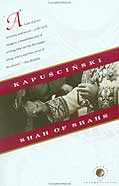
In Shah of Shahs Polish journalist Ryszard Kapuscinski turns his focus to the former Shah of Iran, the CIA supported dictator whose oppressive regime led to the revolution that took Americans hostage in their own embassy, caused the shah's exile, and resulted in the fundamentalist Islamic government that runs Iran today. Kapuscinski published this book in 1982, just a few years after the revolution. In his unique style Kapuscinski weaves history, stories of individuals, and his own observations and interpretations.
It seems as if in every oppressive regime, there is a police authority, a spy network that detains and tortures anyone suspected of not being loyal to the ruling regime. In Iran, that group of thugs was the Savak.
Continue reading "Shah of Shahs - Ryszard Kapuscinski"
Posted by elise at 6:46 PM | Permalink | Email to a friend
January 11, 2005
Imperium - Ryszard Kapuscinski
Writing as a correspondent for various Polish journals and press agencies over several decades, Ryszard Kapuscinski travelled extensively through Africa, Latin America, and the former Soviet Union, documenting brutal conflicts and ravaged countries. Ryszard has a poetic ability to delve underneath the surface of geopolitics and reveal stories at a human level.
In Imperium, Kapuscinski covers the human experience in the territories of the former Soviet Union, starting with his remembrances as a young boy in Poland in 1939, hungry and wondering in quiet fear as his friends got deported, presumably to Siberia. In the 50s and 60s, and then again after Perestroika, Ryszard travels to the far flung outposts of former Soviet territories, reflecting upon the after affects of Stalin and later the dramatic changes from the disintegration of the Soviet empire.
Continue reading "Imperium - Ryszard Kapuscinski"
Posted by elise at 2:13 PM | Permalink | Email to a friend
October 14, 2004
In Harm's Way - Doug Stanton
On the night of July 29th, 1945, the USS Indianapolis, returning from a secret mission to deliver the Hiroshima atomic bomb, was torpedoed by a Japanese submarine and sunk within 12 minutes. Of the 1200 or so men on board, around 300 were killed immediately, 900 abandoned ship. Through a series of Navy communication snafus nobody knew that the Indianapolis was sunk or even missing. The surviving men were picked up four and half days later after a bomber flying overhead happened to notice the oil slick in the water and groups of men in the water. By the time they were rescued, only a little more than 300 of the original 900 had survived. The rest had succumbed to dehydration, delirium, injuries, and sharks. Sharks fed twice a day at dawn and dusk and picked off about 50 men a day.
In Harm's Way: The Sinking of the USS Indianapolis and the Extraordinary Story of Its Survivors by Doug Stanton is a story of courage and despair, death and survival. Stanton spent a year researching and writing this book, interviewing USS Indianapolis survivors and recording their stories. The book is a fast and gripping read; I highly recommend it.
Links:
Interviews with USS Indianapolis survivors
Posted by elise at 2:27 PM | Permalink | Email to a friend
June 14, 2004
A World Lit Only By Fire - William Manchester
Author William Manchester recently passed away which has prompted me to re-read some of his books. One favorite is A World Lit Only by Fire : The Medieval Mind and the Renaissance - Portrait of an Age. Manchester is often accused of being a "popular" historian, more focused on narrative than getting his facts straight. To these detractors I say, phooey. Unlike many history books which are the world's best cure for insomnia, A World Lit Only By Fire is highly readable, entertaining, and enlightening. Manchester paints a grimly realistic picture of what life was like in the middle ages including the stench, the violence, and the pervasive Roman Catholic Church. He shows the seeds and the blossoming of the Renaissance - the combination of technology (printing press), brilliant enlightened minds (such as Erasmus and DaVinci), and Papal funding that brought about a full scale shift in the consciousness of the Western world.
Continue reading "A World Lit Only By Fire - William Manchester"
Posted by elise at 12:18 PM | Permalink | Email to a friend
May 17, 2004
The Age of Federalism - Elkins and McKitrick
- "Virtually a Republican measure . . . giving the President the authority to designate as alien enemies any citizens or subjects of hostile nations residing in the United States whose presence he regarded as dangerous, and to make regulations for their apprehension, restraint or removal as the case might require."
- Major political controversy surrounds the creation of a large "New Army", trained and equipped for the military demands of a new century.
- Judicious leaks of confidential government documents damage the reputation of political opponents in the public eye.
Ripped from today's headlines? Not quite. These are all episodes from American politics in the 1790s!!! They are all described in detail in the bookThe Age of Federalism, the Early American Republic, 1788 - 1800. Authors are Stanley Elkins and Eric McKitrick.
I don't use the term magisterial often, but this book deserves it! This book shows why it is worthwhile to study history.
Continue reading "The Age of Federalism - Elkins and McKitrick"
Posted by mvestrich at 10:25 PM | Permalink | Email to a friend
January 6, 2004
The Shadow of the Sun - Ryszard Kapuscinski
My father first introduced me to the works of Ryszard Kapuscinski through The Emperor, Kapuscinski's unnerving examination of Emperor Haile Selassie's rule in Ethiopia told through the eyes of former members of Selassie's court. With The Shadow of the Sun, Kapuscinski spreads his journalist reach throughout the continent of Africa revealing its mosaic of cultures, histories, tribal worldviews and indomitable geography. Kapuscinski is Poland's most renowned journalist. First arriving in Africa in 1957, he lived there off and on for 40 years observing countless coups and managing to contract malaria as well as tuberculosis. Unlike most European visitors who kept to the safe, wealthy areas, Kapuscinski wanted to know how everyday people - tradesmen, bus drivers, medical aides - lived. In this book Kapuscinski describes the centuries old conflict between the Hutus and the Tutsis that resulted in the extraordinary genocide the world observed in the 90s. He writes of the fundamental differences in how people of different African tribes view themselves in relation to the rest of the world, and how these differences often lead to tragedy incomprehensible to the Western mind. Also revealing was the history of the former American slaves who founded Liberia in the early 1800s only to enslave the surrounding local population for the next 100 years.
Continue reading "The Shadow of the Sun - Ryszard Kapuscinski"
Posted by elise at 10:13 PM | Permalink | Email to a friend
April 28, 2003
The Perfect Heresy - Stephen O'Shea
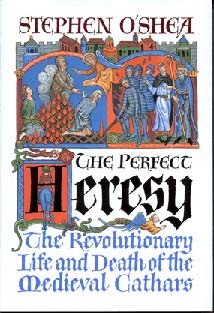
The Cathars were a sect of renegade Christians in the late 12th century in what is now Southern France. They were pacifist vegetarians who shunned materialism, believed in the equality of women, thought the Catholic church had no God-given authority, and believed Jesus was more mythological than historical. Their popular and growing belief system was such a threat to the Catholic church that the church launched an all out assault for a hundred years to stamp them out, thus giving birth to the inquisition. Pope Innocent III, the same pope that granted legitimacy to St. Francis of Assisi and St. Dominic, paves the way for hundreds of years of future brutal repression by endowing Simon de Montfort with the task to make war on the cities who harbor Cathars. Stephen O'Shea's recounts this history in The Perfect Heresy, a compelling story filled with medieval warfare, atrocities, courage and ultimate despair as the last Cathar leader is burned. This was a great read. I could not put it down.
Thank you to Mark Vestrich for this recommendation!
Posted by elise at 11:43 AM | Permalink | Email to a friend
